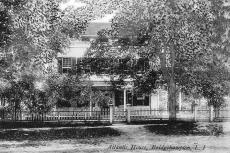The East Hampton Town Board held its first substantive discussion of adult-use cannabis since Gov. Andrew M. Cuomo signed legislation legalizing its recreational use in March.
Towns, cities, and villages are now permitted to pass local laws and regulations governing the time, place, and manner of adult-use retail dispensaries and on-site consumption licenses. They can opt out of allowing either, but if they do so, voters within the municipality can challenge their decision by petitioning for a referendum.
A local law to opt out of retail dispensaries and/or on-site consumption must be adopted no later than Dec. 31. If not done by that date, a municipality cannot opt out in the future, but if it does opt out, it can later opt back in.
In addition to state taxes, there will be a local excise tax of 4 percent on the sale of cannabis products from a retail dispensary. Twenty-five percent of that tax will go to the county, the remainder to the town or village in which the dispensary is located.
The state legislation creates an Office of Cannabis Management, which is governed by a Cannabis Control Board to oversee and implement the law. The former will issue licenses and develop regulations outlining how and when businesses can participate in the new industry.
It is important to hear from the public as to where such businesses should be located, Supervisor Peter Van Scoyoc said, but legalizing personal use of cannabis was an important step, he said, likening the illegal activity around marijuana to that which arose during the prohibition of alcohol from 1920 to 1933.
"One thing we are allowed to do," John Jilnicki, the town attorney, told the board, "is regulate the time and location of these businesses." The town, he said, can decide on zoning districts in which to permit a dispensary or place of on site consumption, and hours of operation. The town could also permit dispensaries but not on site consumption.
Like bars or taverns, dispensaries or places of on site consumption should not be allowed near churches, schools, or public parks, Councilman David Lys suggested.
Can the town regulate the production of cannabis? Mr. Van Scoyoc asked.
"From what I see," Mr. Jilnicki said, "it doesn't appear we have authority to regulate production."
The supervisor said that his concern related to farming. "While I understand that producing this product locally for local sale or consumption is probably good for the local economy," he said, "I wouldn't want to see all farmland converted from food production to something that's more a recreational resource." Councilwoman Sylvia Overby voiced the same concern, but Mr. Van Scoyoc wondered if cannabis cultivation might largely be in "more controlled environments," such as indoors.
Could the number of dispensaries per hamlet be controlled? Ms. Overby asked. No one knew for sure.
Board members should take the issue to the citizens advisory committees to which they are respectively assigned, Councilwoman Kathee Burke-Gonzalez suggested.
"We have a general outline of areas we need to continue to review," Mr. Van Scoyoc said. He reiterated the importance of public engagement, but "at some point we will have to make a determination."



